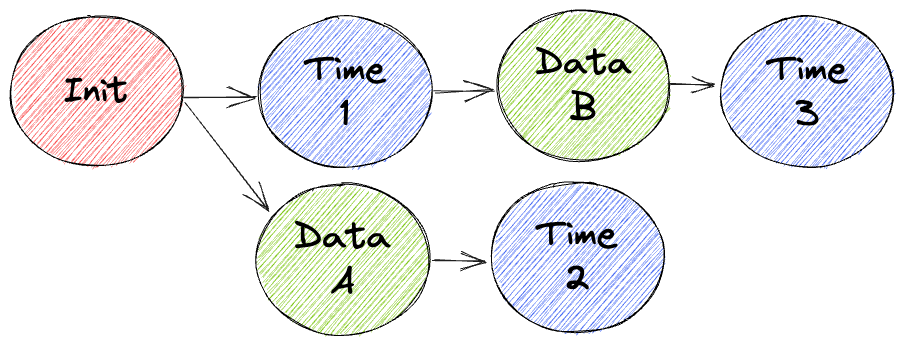Hi! In general, this looks very nice! Posting some thoughts from a first proper readthrough:
Semantics
In my mind, it’s not super clear from the list of definitions whether a data event is considered uncovered if only used as prev in a time event. This is the definition given:
Ais anuncovered eventif there is no event withA’s CID in itsprevfield.
Here is one example of an unclear example:
- If a stream is in a diverged state (see events
AandBin fig. 5), we only consider branches that contain valid, uncovered Data Events.
Looking at the graph, there are no uncovered Data Events given the initial definition, as there are time events that use them as prev:
Is an uncovered event the same as a stream tip, or is it explicitly a data event, followed by 0-1 time events, but not any additional data events?
Merge points
When the CIP states “the controller fixes [the problem] with a data event C”, does that mean that trying to create a non-multi-prev data event will fail on reasons of stale state? Or is it up to the controller whether it wants to merge the fork?
Also, I want to verify my understanding of anchor times and hence stream ordering here:
- init @ 1
- data A @ 2
- data B @ 3
- data C @ 4
Multiple uncovered fork events
Consider this property:
- For branches that contain valid, uncovered Data Events, we only consider the first Data Event on a branch after the fork.
What if there are two events? This ties into my other thread re. late publishing attacks (Trace/verifiability of late publishing attacks), but consider I create a checkpoint of two fast data events in a row, they are anchored but not transmitted to the network. Call this branch A.
I later on work on a fork from the init event, building up a series of data events. Call this branch B. Something makes me want to undo my publication, so I transmit the checkpoint events to the network. Will the multi-prev consensus resolution then just merge my first commit from B, into the A branch? Or will it work some other way?
In general, what is the reason for the one-event limit? It feels like there is some particular case it avoids, but I can’t figure it out ![]()
Thanks ![]()

